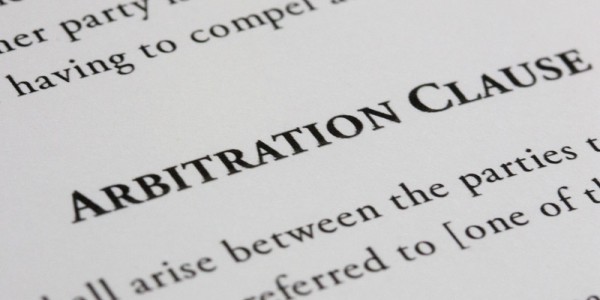Arbitration clauses can be a nuisance. Wait. How can it be if it is the arbitration clause itself that gives life to the arbitration?
But it’s true that arbitration clauses often have terms contrary to the instincts and desires of counsel on both sides of a case.
Some counsel may prefer that the contract doesn’t have an arbitration clause at all. Others may want arbitration but will feel constrained by certain provisions or lack thereof. The clause may require three arbitrators when only one is enough. It may compel arbitration in an inconvenient location. It may impose a less than ideal choice of law. Or it may allow or prohibit discovery when counsel feel it is or isn’t needed.
And, to make matters worse, Arbitrators may feel compelled to interpret the clause – and the intentions of the parties – in ways that neither side anticipated and neither side wants.
How does this conundrum come about? In many ways – but most obviously because there is almost always significant time lapse confronting the contract drafters who included the arbitration clause at the creation of the deal – and counsel who are engaged to handle the arbitration years later after a dispute arises.
At the start of the deal, the focus is on the parties working together towards an idealized goal. Almost always, little if any attention is given to dispute resolution. Where an arbitration clause is included, because one side or both thinks it may provide for faster, less costly, more private or more expert dispute resolution, there may still be limited attention to the details. The parties may insert a form clause, perhaps one used before in another contract, changing the location of the arbitration but little else.
Less often, the drafters will give the clause extra attention by including provisions on arbitrator qualifications and details on procedures to ensure that the arbitration will meet their expectations.
But in all scenarios, the drafters will have no certainty as to what dispute will arise. They can make their best guesses but a dispute may end up being tens of millions of dollars smaller or larger than they anticipated. The drafters may anticipate that any dispute can be resolved quickly but, when things go bad, the unexpected may happen. The dispute can involve subject matters and claims that were unanticipated. A distribution contract can lead to fraud and unfair competition claims. A licensing contract can lead to copyright or patent infringement claims. A services or joint venture contract can lead to data breach, trade secret or other complex IP counterclaims.
Adding to the conundrum is that counsel engaged to resolve the dispute will have their own ideas on how the dispute is best resolved. They may prefer not to be bound by the dictates of the contract drafters. They may prefer a forum or set of procedures different than what is provided for in the arbitration clause.
One of the great things about arbitration is that, if the parties agree, they can change the process to suit their liking. The parties can change the location of the arbitration, alter the number of arbitrators, provide for discovery, have motion practice, or forgo arbitration altogether if they think that will be a better path for both sides.
But what about where the parties don’t agree? All too often, by the time claims are asserted, one side or the other is disinclined to change the process if it is perceived doing so will benefit the other side. In those all too often instances, the Arbitrator is left to decide how to proceed.
Arbitrators are bound to follow the dictates of the arbitration clause. Failure to do so is the most likely ground for an arbitration award to be vacated. So if the divide between what the drafters set out and what one side or the other wants now are far apart, the drafters win. Unless both sides agree to change express terms, what the clause says governs.
But there are many instances where the drafting does not clearly address the question. Where the parties specify “discovery” should there be unlimited discovery? Should the promise of speed and cost savings in arbitration even matter if counsel are more concerned about detailed evidence gathering? Where parties are from different countries and do not specify international rules, should requirements for limited document disclosures and other international procedures apply? And even if the clause specifically provides for international rules, is that the best approach for the case?
Indeed, shouldn’t we be guided by what makes the most sense for resolution of a case rather than trying to decipher what the drafters intended? Because, in reality, most likely the drafters never gave the nuances of arbitration procedure much thought. The counsel handling the case are much better suited to decide how best the arbitration should be handled.
Several lessons can be drawn from the conundrum. First, in drafting arbitration clauses, less is often better. Unduly complex arbitration clauses are likely to miss the mark and complicate matters. Often standard institutional clauses (perhaps with the addition of a confidentiality provision) may be all that is needed.
Second, parties should keep in mind that they are free stipulate on the process. Unlike a court case, the parties decide the process. There is no reason to be tied to a process that doesn’t fit your needs. Engage counsel who understand arbitration practice and procedures so they can manage it properly.
Third, arbitrators can’t – and won’t – disregard an arbitration clause but when questions arise, considerable deference should be given to counsel who are handling the case. Call this a choice between originalism – looking just to the arbitration clause – versus viewing the arbitration clause as part of a relationship between the parties, one that was only started at the time of drafting. The parties shouldn’t be locked to a process that doesn’t suit their needs. Arbitrators should be receptive to ways to make the arbitration better meet the needs of the parties.
Arbitrators should never ignore the arbitration clause. On the other hand, they should be receptive to the current day needs of the parties and the preferences of counsel handling the dispute.
GLB

